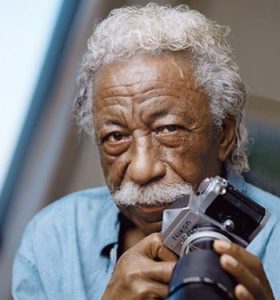
Gordon Parks
*Gordon Parks was born on this date in 1912. He was a Black photographer, writer, and filmmaker.
Gordon Parks was born in Fort Scott, Kansas, the youngest of fifteen children. His mother’s death at a young age and his father’s inability to manage the household led to the family’s breakup and his moving to Minneapolis with his married sister. Unwelcome in his brother-in-law’s house, he soon found himself living on his own, struggling to attend school and support himself. He graduated from Mechanic Arts High School in St. Paul.
During the great depression (now out of school), Parks absorbed all forms of education with close attention to the talented men and women he encountered in various jobs. Now a young husband and father, Parks worked as a bellhop, semi-pro basketball player, musician, and member of the Civilian Conservation Corps. During these times, Parks wrote, composed, and took in what he could not receive in school. The picture magazines of the times, Vogue, Harper’s Bazaar, and especially the brand new Life, caught Parks’ imagination. With an incentive from a newsreel presentation from camera-man war footage in a Chicago movie theater, he bought his first camera in 1937.
With zeal, talent, and patience, Parks began learning his craft. A successful fashion feature for an upscale Minneapolis department store caught the eye of Marva (Mrs. Joe) Louis, who encouraged him to establish himself in Chicago. His fashion background served him well in the windy city’s Gold Coast social circles. Yet, in his spare time, Parks documented the torrid poverty of Chicago’s south side and the quickening growth of African American migration in the areas around the Great Lakes.
His camera work won him the first Julius Rosenwald Fellowship in photography. The money allowed Parks to collaborate with visual mentor Roy Stryker in Washington D.C. at the Farm Security Administration during the closing window of the New Deal agency's documentation of depression conditions in America. He worked with Stryker until 1947, shooting for Vogue and Glamour while writing two books on photo technique. Parks spent over twenty years shooting for Life magazine, part of which was an influential time in their Paris office, where he covered fashion, the arts, celebrities, and politics.
The window of opportunity (seized) for him was a modern expression and worldwide recognition. However, the African American experience of lessening racial barriers was equally important, allowing his creative juices to flow. In the United States, his photographic essays of the 1950s and 1960s were poignantly impacting. He deliberately photographed all aspects of America and the world, winning him many firsts as a black photojournalist. Parks’ most extended assignment began in 1961 when he came to Brazil to shoot the slums of Rio de Janeiro.
His story and photos of Flavio da Silva, a boy Parks found dying of asthma, attracted international attention, gifts, and medical treatment. Simultaneously, with the emerging American Civil Rights Movement, he engaged in the activities of its personalities through his craft. His 1971 anthology Born Black is a collection of these images. His gift for telling stories came to the fore in 1963; he was the first Black to direct a major Hollywood film (The Learning Tree), which he wrote and produced.
This was followed in 1966 by A Choice of Weapons. Parks also gained attention as a poet and composer; his credits are - Shaft 1971, Leadbelly 1976, and Odyssey of Solomon Northrup 1984. Parks has received many awards, degrees, and citations, including Photographer of the Year from the American Society of Magazine Photographers in 1960 and the Spingarn Medal from the NAACP in 1972. In 1989, Parks created a Ballet entitled "Martin."
He wrote books such as Half Past Autumn (1997), A Star for Noon (2000), A Hungry Heart: A Memoir (2005), and Eyes With Winged Thoughts (2005). Gordon Parks died on March 7, 2006, and was a pioneering Black representative for print and feature content worldwide in visual media.
To Become a Photographer
To Become a Media Producer or Director
African Americans/Voices of Triumph
by Dr. Henry Louis Gates Jr.
Copyright 1993, TimeLife Inc.
The Associated Press
permissions
450 W. 33rd St.,
New York, NY 10001.